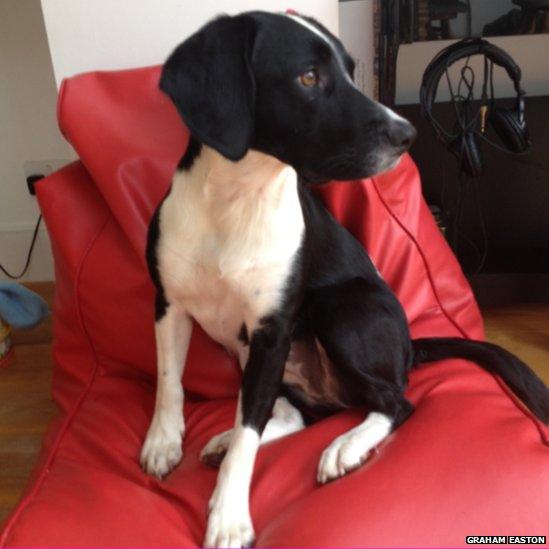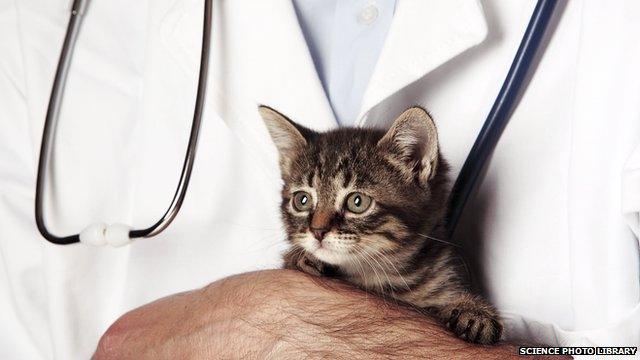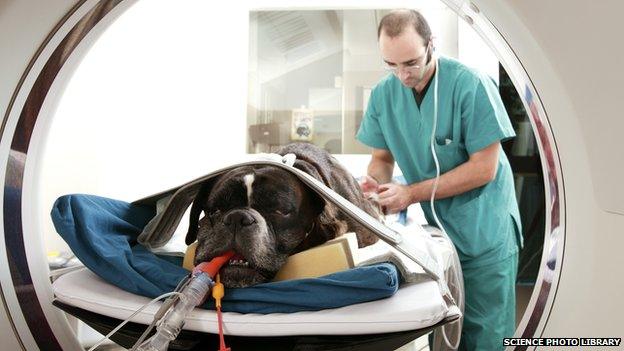The vet will see you now...
- Published

It's a dog's life - or is it?
How does the care and compassion shown to animals when they are sick compare to the treatment patients receive in the NHS?
"I'm really impressed with the care she gets," says GP Dr Graham Easton of his dog, Molly.
There are, of course, a number of important differences between the care humans and animals receive. In the UK, veterinary care is not free at the point of delivery whereas in the NHS, every human patient is treated equally according to their need and not their bank balance.
Arguably, the health system is under severe strain as a result. Dealing with complex human beings is very different to dealing with sick animals, but it has been suggested that lessons could be learned from watching how vets organise and deliver care and, particularly, how animals are looked after at the end of their lives.
In a vets' practice in Chipping Norton, there is a separate waiting area for dogs and cats.
According to head vet, Martin Whitehead, they have made a point of thinking about the experience of their patients.
"It's not nice for a cat to be seated next to a big bulky dog," he says.
There's a big airy treatment room and a diagnostics lab - complete with an X-ray and ultrasound scanner for looking at the abdomen and the heart - and it's all under one roof.
When a blood sample from Biggles the boxer, who has cancer and is off his food, is taken for testing in the in-house lab, the results come back very quickly.
GP Graham Easton is envious. saying: "It would be lovely to get blood results back that quickly. Not many GPs' surgeries can offer that kind of service."

Molly has always received excellent care from her vet, says owner Dr Graham Easton
Vets are true generalists, in every sense of the term. They can take care of pets with cancer and carry out surgery on a cruciate ligament injury in a dog, for example, without the need for referral to a specialist or the mention of a long waiting list.
But it all comes down to whether the owner can afford it. The private care system vets operate under means owners have to pay for the care their pets receive, or take out pet insurance to help pay for it.
This is likely to make owners think before they attend, which helps make the system more efficient.
However, a lack of evidence in veterinary medicine means vets have little research to back up their choice of treatment - and this could lead to unnecessary operations, Mr Whitehead suggests.
"It would be lovely to have a big database of evidence to rely on," he says.
In contrast, human medicine is well-researched and very evidence-based. The guidelines are written down and recommended. On the whole, doctors know if people are going to benefit from a particular treatment or not.
They can also communicate with a human patient and discuss the best options for his or her treatment.
But the biggest challenges for the NHS are in how the systems work.
A common complaint is that it's difficult to get an on-the-day GP appointment without seeing a different GP from the previous time, thereby losing something very precious to patients - "continuity of care".

Is there more time for compassion in the private system of vet care?
So couldn't doctors take a leaf out of vets' books and work together more closely to make their services more efficient?
This is starting to happen in the NHS with GPs' surgeries now delivering a wider range of community services which are tailored to the needs of its patients.
While "integrated care" isn't appropriate or possible everywhere in the NHS, it is bringing some groups of health professionals together to improve patient care.
Hugh Alderwick, a healthy policy advisor at the Kings Fund - an independent charity which works to improve health care in England - says it's about "seeing care through the eyes of the patient".
Dr Easton agrees, saying: "Wouldn't it be lovely to see the same doctor every time? People really value it, particularly when things get difficult."
He says understanding, compassion and sensitivity are noticeable in the way vets treat animals.
Yet these are qualities that patients often say are missing in the NHS. Lengthy waits, poor care and a lack of communication are accusations frequently directed at the health service.
Without doubt there are many compassionate staff in the NHS, but perhaps when the system is overstretched and stressed, there is less time and space for health professionals to show it.
Is it possible that at the end of life animals get better care too?
Prof Bob Michell, a past president of the Royal College of Veterinary Surgeons, thinks so. He lost his wife to pancreatic cancer and saw her suffer greatly during her last few weeks, despite excellent palliative care.
In contrast, he says, their beloved Labrador was "eased into sleep to the sound of birds singing" and the contrast has always haunted him.
He believes humans should be able to choose how and when they die.

Vets are generalists and can treat any number of conditions in animals
"Few things are more important in patient choice than the circumstances of one's death. Why set a higher value on human life and then let people suffer?"
However Prof Irene Higginson, a palliative care consultant at King's College London, says the comparison with animals is a dangerous one because it is always the owner who decides on the time of death, rather than the animal.
She is concerned that some people would be rushed towards euthanasia because of poor care and a lack of hospice spaces, and because they fear being a burden on their family.
"The emphasis should be on improving their quality of life. A lot can be done to look after the whole person and their family," she says.
Dr Easton is fiercely proud of the NHS. It may be stretched to the limit, he says, but it does a challenging job on complex human beings.
Yet, perhaps medics could learn from the customer focus that comes from private care - the ease of access, compassion and sensitive communication.
"Medics and vets spending time in each other's worlds would be no bad thing," he says.